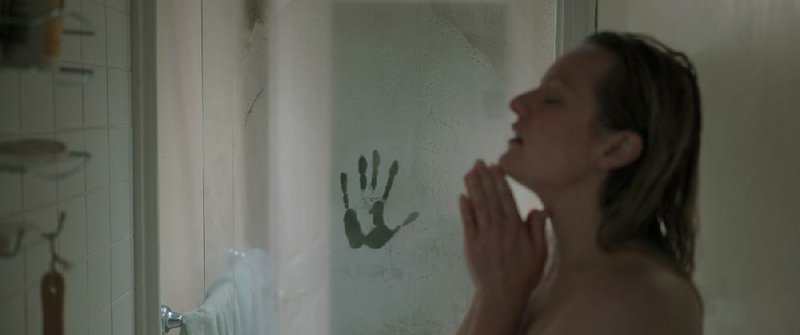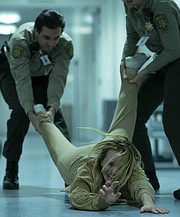Leigh Whannell's The Invisible Man is thoroughly modern in approach and sophistication, but the film it most reminded me of was made back in 1944. George Cukor's Gaslight starred Charles Boyer as a loathsome husband who attempts to convince his already anxious wife (Ingrid Bergman) that she's going insane by secretly rearranging things in their house and taking things from her so she thinks she's always misplacing them. He preys on her emotional vulnerability in order to mask his own pathology and emotional detachment. The effect is absolutely enraging: Onscreen, he's one of the more hateful villains ever committed to celluloid.
An equally controlling and oppressive husband is behind similar skullduggery in Whannell's updated horror flick, though he's not content with making his wife believe she's insane: For the crime of having left him, he stages his own death, and then torments her in a homemade invisibility costume until her life is irrevocably destroyed.
The Invisible Man
87 Cast: Elisabeth Moss, Aldis Hodge, Storm Reid, Harriet Dyer, Michael Dorman, Oliver Jackson-Cohen
Director: Leigh Whannell
Rating: R, for some strong bloody violence, and language
Running time: 2 hours, 4 minutes
This creepy fellow is Adrian Griffin (Oliver Jackson-Cohen), a fantastically brilliant optics scientist with his own multi-million dollar company. As professionally successful as he may be, though (and judging from his staggeringly elegant mansion overlooking the San Francisco bay, we can assume he has done well for himself), he's a disaster of a person, an obsessive narcissist whose corrosively controlling ways have alienated him from his furtive wife, Cecilia (Elisabeth Moss). As the film opens, Cecilia is enacting an elaborate getaway scheme out of that fabulous house, barely escaping the security camera
alarm system and having to clamber over the wall surrounding their shared fortress, before eventually landing at her safehouse, the home of her friend James (Aldis Hodge), a cop, and his teen daughter, Sydney (Storm Reid).
Still paranoid that her deeply abusive husband will track her down even weeks later, Cecilia is too scared to leave James' house -- in a small moment that suggests the care and precision with which Whannell has put together this tightly constructed scary thriller, the very moment she sets foot on the welcome mat beyond the front door, he focuses his camera on the press of her instep, holding the shot an extra beat to establish her fear -- that is, until she learns from her sister (Harriet Dyer), that Adrian has apparently killed himself, freeing her, at last, from his clutches.
Initially relieved -- another great moment: A long shot of Moss's ever-expressive face sitting in stunned silence alone on the bathroom floor, as the fear and tension in Cecilia's face finally melts off of her -- Cecilia is soon contacted by Adrian's lawyer brother (Michael Dorman), who has Adrian's final wishes to enact. He has left a large fortune for his estranged wife in his absence, provided she signs the paperwork and leaves her contact details.
Soon after, however, strange things begin happening at James' house: Cecilia, still fragile, feels watched and becomes convinced that somehow Adrian is still alive and re-enacting many of his same sadistic behaviors with her as before. When things go from bad to worse, Cecilia finds herself similarly isolated and vulnerable as during her marriage, forcing her to take action against a phantom only she believes in.
Whannell, longtime writing collaborator with fellow Aussie James Wan (the two created the Saw franchise, as well as Insidious), has a good handle on scary tension. Early in the film, his camera delights in looking away from the characters in the frame and focusing on a benign seeming couch, as if to suggest there's something or someone there we can't yet see, either. But beyond the film's spooky thrills, he's also working with powerful material, a horror treatise for feminine empowerment in the #metoo era. Adrian, handsome, rich and aggressively arrogant, serves as a proxy for all the powerful men with Gibraltar-size egos constructed of single-ply tissue, who take as their victims women they feel they can dominate.
As previously noted, Moss is thoroughly absorbing, beginning anxious and hunted, before eventually transforming into a formidable opponent for the cocksure Adrian. Her willingness to plunge the depths of her characters' psyches -- as wrenching as that can be -- gives them a dimension of emotional range that many other actors can't reach (similar to Joaquin Phoenix's embracing of his characters' dark souls). The combination of her performance and Whannell's sharp rendering gives us a palpable sense of her paranoia (aided greatly by the fact that the director withholds obvious visual clues as to Adrian's whereabouts, putting the audience in the same boat as poor Cecilia), which gives the film a sharply acrid edge.
It's also admirable in the careful construction of its screenplay: In an early scene, Cecilia buys James a proper step-ladder as a thank you. He needs it to paint the interior of his house, an ongoing project. Later in the film, both the ladder and the paint factor greatly in one of the film's most chilling moments. There's the sense that few details are wasted or throwaways. The screenplay doesn't call attention to these effectively minute decisions, but they're available if you choose to look.
Notably, there is another major difference between this thrillingly spooky flick and Cukor's 1944 classic, beyond the basic premise and subject matter. In the latter, Bergman actually does begin to doubt herself, so sunk in she is in her grief and confusion. In this heady film, Cecilia never crosses herself, no matter how many people around her doubt her sanity: Her evil ex-husband might convince the rest of the world she's not in her right mind, but she knows all along who's behind it. And she never wavers in her self-conviction. As much as he tries to get in her head, she maintains an unshakable sense of reality, a victory unto itself. In the end, it is her inner strength and self-belief that he can't take away from her, and that is enough.
MovieStyle on 02/28/2020


